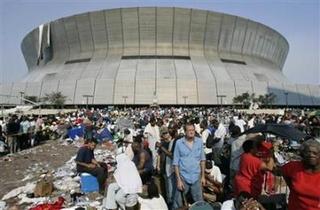How Many More Must Die?
Required reading from Sydney H. Schanberg:
We are a nation at war—globally—against
terrorism. But here at home, except for extra
security at travel terminals, one could hardly
guess it.
There is no war footing to be seen. Washington
has not mobilized Americans on the home front.
President Bush has made it clear that he wants it
that way.
Yet the war is real. And the sacrifices are being
borne solely by the roughly 160,000 men and
women in uniform who are risking—and
losing—their lives in Iraq and Afghanistan. And by
their grieving and worried families. National
politicians, though they lavish the country's
military population with warm rhetoric in public,
privately do not regard them as a voting bloc to
worry about.
As of early this week, 1,918 American soldiers
have died in Iraq and another 236 in Afghanistan,
for a total of 2,154. The count of wounded has
passed 15,000—more than 14,000 of them in
Iraq. There is no official count of Iraqi civilian
deaths in this war, but independent surveys put
the death figure somewhere between 26,000 and
30,000. No reliable casualty figures on Afghan
civilians are available.
While our soldiers die, the policies of the Bush
administration call for virtually no sacrifices or
commitments from the 300 million other
Americans. To the contrary, they are told that
their taxes will continue to be reduced—even as
the war goes on, costing upwards of $5 billion
each month.
The closest President Bush has come to seeking
a nationwide commitment was a speech in which
he asked Americans to use the Fourth of July to
"find a way to thank the men and women
defending our freedom by flying the flag, sending
a letter to our troops in the field, or helping the
military family down the street." A professor
emeritus of military sociology at Northwestern
University, Charles Moskos, calls this "Patriotism
Lite." "That's what we're experiencing now in
both political parties," he was quoted as saying
in a recent New York Times story. "The political
leaders are afraid to ask the public for any real
sacrifice . . . "
So what does this failure to seek shared sacrifice
mean? It seems to mean that our leaders—not
only the Republicans but the Democrats, who
followed meekly behind—knew that if they had
spoken candidly to the public and told them that
the threat from Iraq was not only not imminent
but minimal and that therefore this was not a war
of necessity but one of choice for other,
unexplained reasons, then voters might have
been aroused enough to rally and block the White
House's rush to invasion. This would indicate that
President Bush was convinced that, after the
invasion, continued support for his crusade had
to be conditioned on demanding little from the
public. Meanwhile, our soldiers are being killed
and crippled every day. In our system of
democracy, this leaps out as a perversion. Are
these volunteer men and women in uniform to be
regarded simply as mercenaries? Or do we care
about them?
Read the rest at the Village Voice.






